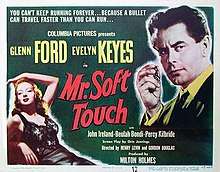Mr. Soft Touch
Mr. Soft Touch is a 1949 American film noir crime film directed by Gordon Douglas and Henry Levin and starring Glenn Ford and Evelyn Keyes.[2] The film is also known as House of Settlement.[3][4][5]
| Mr. Soft Touch | |
|---|---|
 Theatrical release poster | |
| Directed by | Gordon Douglas Henry Levin |
| Produced by | Milton Holmes |
| Screenplay by | Orin Jannings |
| Story by | Milton Holmes |
| Starring | Glenn Ford Evelyn Keyes |
| Music by | Heinz Roemheld |
| Cinematography | Charles Lawton Jr. Joseph Walker |
| Edited by | Richard Fantl |
Production company | Columbia Pictures |
| Distributed by | Columbia Pictures |
Release date |
|
Running time | 93 minutes |
| Country | United States |
| Language | English |
| Box office | $1.6 million[1] |
Plot
Polish American Joe Miracle returns from fighting in World War II, only to find his San Francisco nightclub under the control of the mob, and his friend and partner Leo missing and presumed murdered. To get even, he robs $100,000 from his former business, planning to leave the country as soon as possible. He goes to the apartment of Victor Christopher, Leo's brother, where he picks up a ticket Victor and his wife Clara had purchased for him. However, he discovers to his dismay that they could only book him on a ship that sails for Yokohama on Christmas Eve, the next night. He has to hide until then. When the police come to stop Victor from ringing a bell and disturbing the neighbors, Joe pretends to be him in order to spend the night safely in jail. However, Jenny Jones, a kindhearted social worker, gets him remanded into her custody instead.
She takes him to the Borden Street Settlement House, where the down and out are helped, among them a talkative, opinionated carpenter named Rickle. As they get better acquainted, Jenny and Joe begin falling in love, though she turns down his advances, as she believes he is a wife beater. Joe causes trouble. He turns the tables on some youths who try to cheat him at craps and also accidentally falls on an old piano, breaking it. Feeling responsible, he goes to a nearby piano store (actually a front for a gambling parlor) and, pretending to be newly assigned to the police precinct, cons the owner into donating a piano in return for Joe turning a blind eye to the illicit activities there. However, he is recognized by newspaper columnist Henry "Early" Byrd.
Byrd tries to find out from Jenny if Joe is staying at the settlement house, but she refuses to divulge anything. From Byrd's description, Jenny realizes that Joe is not Victor. When she finds out Joe also has a pistol, she insists he leave. Byrd returns and tries to get Joe to tell him the name of the man providing protection to the crooks, but Joe refuses to talk. When he collects his money, Jenny pleads with him to give it back so they can start a life together. He counters by asking her to leave the country with him. Neither accepts the other's proposal. Meanwhile, the mobsters force Clara to tell them where Joe is hiding and start a fire to smoke him out. They recover the money, but the settlement house is left in smoldering ruins.
Joe enters the nightclub through a secret passageway and takes the money again from the new boss, Barney Teener. He hires some men to dress up as Santa Claus to distribute presents to the children at a fundraiser at the settlement house. Joe slips in as another Santa and leaves the money to pay for the rebuilding. As he slips away, Jenny realizes what is going on and chases him out into the street, calling his name. Hearing this, the waiting mobsters shoot Joe in the back. The film ends at this point, leaving it unclear whether he will live or die, or what the future holds for the couple.
Cast
- Glenn Ford as Joe Miracle
- Evelyn Keyes as Jenny Jones
- John Ireland as Henry "Early" Byrd
- Beulah Bondi as Clara Hangale
- Percy Kilbride as Rickle
- Clara Blandick as Susan Balmuss
- Ted de Corsia as Rainey
- Stanley Clements as Yonzi
- Roman Bohnen as Barney Teener
- Lora Lee Michel as Sonya
- Harry Shannon as Police Sergeant Garrett
References
- "Top Grossers of 1949". Variety. 4 January 1950. p. 59.
- III, Harris M. Lentz (2008). Obituaries in the Performing Arts, 2006: Film, Television, Radio, Theatre, Dance, Music, Cartoons and Pop Culture. McFarland. p. 215. ISBN 9780786452118. Retrieved 15 November 2019.
- "House of Settlement". FilmAffinity. Retrieved 15 November 2019.
- Maltin, Leonard (2015). Turner Classic Movies Presents Leonard Maltin's Classic Movie Guide: From the Silent Era Through 1965: Third Edition. Penguin. ISBN 9780698197299. Retrieved 15 November 2019.
- Blottner, Gene (2015). Columbia Noir: A Complete Filmography, 1940-1962. McFarland. p. 263. ISBN 9780786470143. Retrieved 15 November 2019.